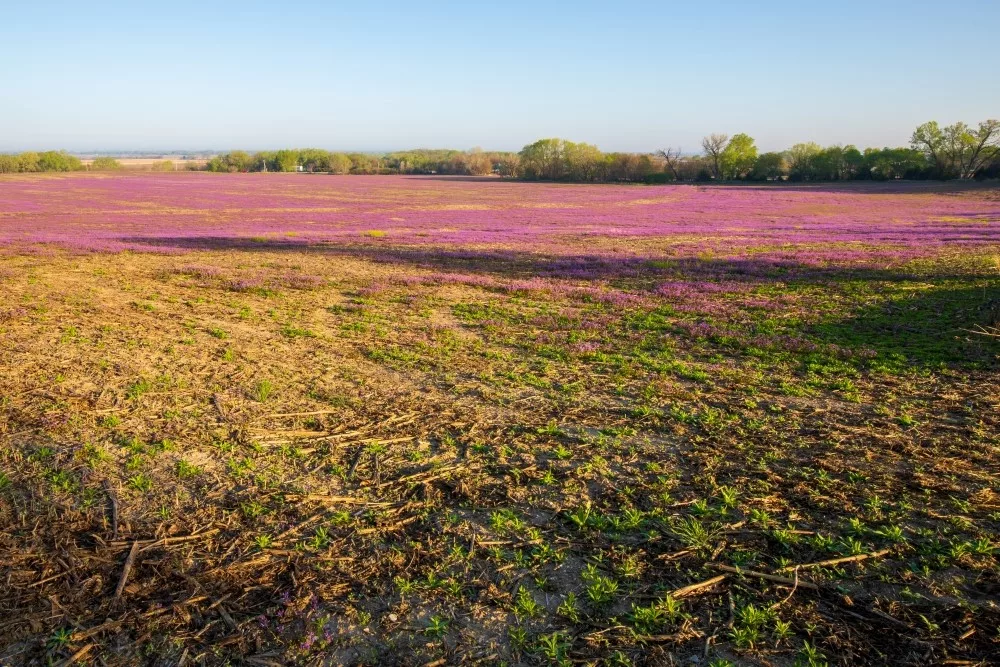Your browser doesn’t support HTML5 audio
For the casual observer, those Indiana farm fields of purple might look kind of pretty, but farmers know that henbit and purple deadnettle are just weeds that need controlled. A mild winter allowed weeds to get a good head start this year.
“We’ve had these purple flowered weeds, henbit and purple deadnettle, for decades in this area and throughout the Corn Belt,” says Dr. Bill Johnson, Purdue professor of weed science. He’s a guest on the latest Purdue Crop Chat Podcast, available now at hoosieragtoday.com or wherever you listen to podcasts.
Johnson warns that henbit and purple deadnettle can also serve as an alternative host to soybean cyst nematode.
“And so, when we have what appears to be the pattern that we’re in now with kind of a warm, extended spring, but a little on the wet side, if we’re not able to get the henbit and purple deadnettle controlled, we can allow more reproduction of SCN on those weeds in the springtime as well which can increase higher populations of those weeds in the long run.”
Johnson adds that, “if we’re in the pattern that we’re in now, where our daytime air temps are primarily highs in the 50s, lows in the 30s, I think we’re still okay to spray under those conditions. But expect the herbicides to work more slowly.”
Hear more from Johnson, Dan ‘Corn’ Quinn, ‘Soybean Shaun’ Casteel, and new Extension Weed Specialist Tommy Butts on the new Purdue Crop Chat Podcast below.
-
Purdue Crop Chat Episode 72, A Quick & Dry Harvest
-
Purdue Crop Chat Episode 71, Early Harvest Results & The Corn Sweats
-
Purdue Crop Chat Episode 70, Breaking Down the August USDA Reports
-
Purdue Crop Chat Episode 69, Root Lodging and Ponding From Recent Storms
-
Purdue Crop Chat Episode 68, Tissue Sampling, Scouting, & Progress
-
Purdue Crop Chat Episode 67, Tar Spot is Here Earlier Than Ever Before
-
Purdue Crop Chat Episode 66, Weather Frustrating for Some, Great for Others
-
Purdue Crop Chat Episode 65, 'Planting Progress Envy'
-
Purdue Crop Chat Episode 64, Weed Control Strategies & Technologies
-
Purdue Crop Chat Episode 63, Dan & Shaun Get Ready for Planting
-
Purdue Crop Chat Episode 62 from Commodity Classic 2024
-
Purdue Crop Chat Episode 61, USDA's Final Indiana Yield Numbers and Farm Fashion
-
Purdue Crop Chat Episode 60, Do Biologicals Work?
-
Purdue Crop Chat Episode 59, Record Breaking Yields in Indiana
-
Purdue Crop Chat Episode 58, Surprisingly Strong Early Yield Results
-
Purdue Crop Chat Episode 56, The Impacts from the Recent Heatwave
-
Purdue Crop Chat Episode 55, Breaking Down the August USDA Reports
-
Purdue Crop Chat Episode 54, Tar Spot and Other Corn/Soybean Diseases
-
Purdue Crop Chat Episode 53, Is Now the Time for a Fungicide Application?
-
Purdue Crop Chat Episode 52, Northeast Indiana Crop Update & the Smoky Air from Canada
Purdue Crop Chat
Purdue Extension's Dan 'Corn' Quinn & 'Soybean Shaun' Casteel provide timely agronomic info on the Purdue Crop Chat Podcast! Joined by HAT's Eric Pfeiffer, Quinn & Casteel can't help but debate which is better- corn or soybeans? This podcast is presented by the Indiana Corn Marketing Council and Indiana Soybean Alliance.

